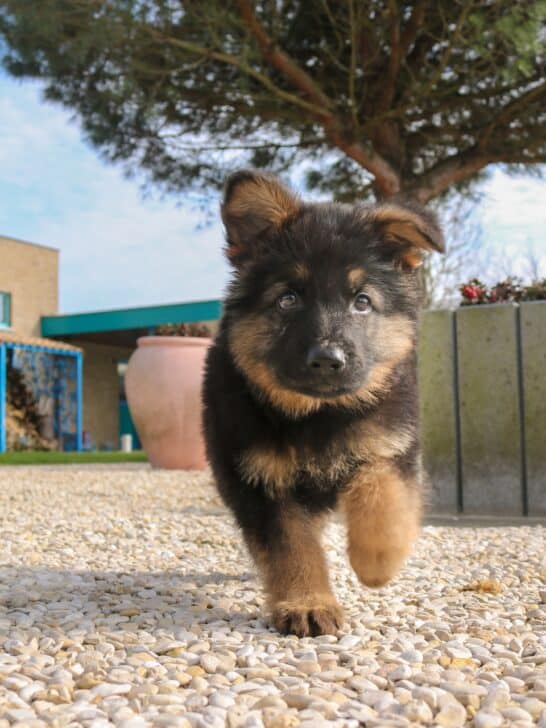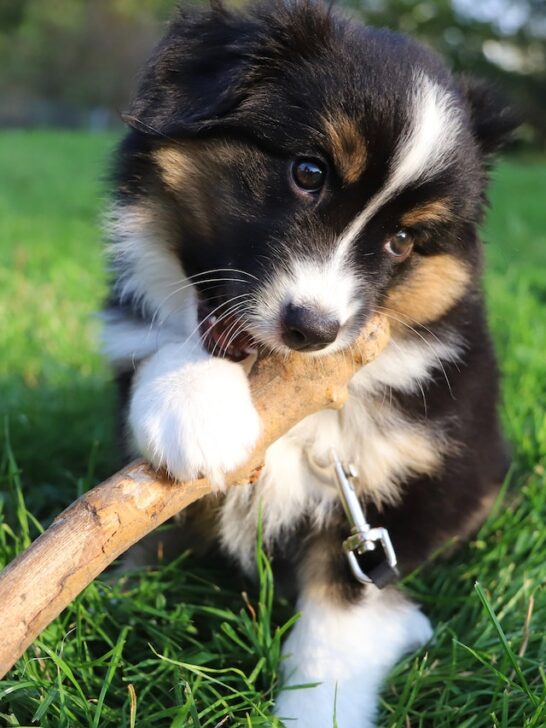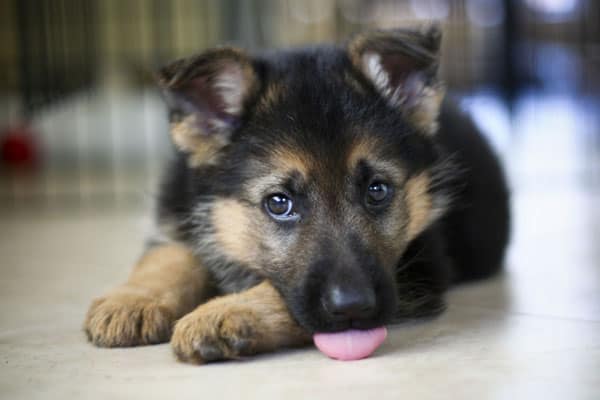Do German Shepherds Only Bond With One Person?
From Jack London’s Buck in Call of the Wild to the popular Lassie and the loyal Rin Tin Tin, these literary characters seem to symbolize our romantic view of the one-person dog and his or her ability to overcome hardships.
The fact that these dogs succeed in tandem with their owners, whether their rescuer or a young boy, only enhances the story’s appeal.
Do you ever wonder why the German Shepherd is so enduring as one of the most desirable dogs?
Is it because we know the Shepherd will choose us above all others? Do German Shepherds bond o one person?
The GSD tends to attach to a single person, but the issue of bonding is more complicated than a mere linear relationship.
German Shepherds can form attachments to multiple people with a preference for one man, woman, or child.
A GSD can bond almost entirely with one person but still protect everyone that belongs to the family unit.
German Shepherds can bond sequentially, such as between handlers in the military or police.
Moreover, Shepherd’s bond can strengthen and decline with different individuals.
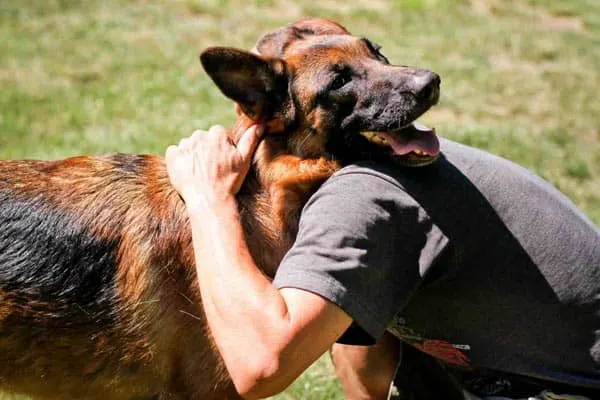
How do you build a strong bond with your German Shepherd?
There are various ways to ensure an attachment between yourself and your dog, whether she is a family pet or an indispensable working animal.
German Shepherds can prove challenging in forming bonds because they often choose who they will respect and follow most closely.
If you are the head of your family, you must take action to ensure your Shepherd sees you as his leader also.
Can you use food to strengthen bonding?
Treats, especially, seem to pave the way towards developing friendships between humans and dogs.
Multiple factors are likely responsible for bonding through the use of tidbits.
First, you usually will select a highly-desired morsel to tempt your dog.
By dispensing your dog’s favorite treats, you are supplying a high return on her investment, which can be an action or behavior.
Fair rewards stimulate bonding.
Second, treats as part of training establish bonding through an interactive activity that reinforces your leadership role in your dog’s life.
Moreover, training can lead to a sense of satisfaction and partnership between you and your dog.
Relying on food alone to establish a bond with your German Shepherd is risky. Many Shepherds are not very food-oriented.
A Shepherd may not take you seriously if you do not spend much quality time with her, even if you are the primary caretaker.
Have you ever witnessed a situation where Mother fed the family dog, but the pet still associated most closely with one of the children or perhaps Dad?
Theories suggest that the dog’s pack mentality does not necessarily tie feeding to close familial bonds.
If you think about how dogs relate in the wild, their seeming lack of gratitude for food makes sense.
Everyone in the pack feeds on whatever the hunters bring down. Contrary to popular belief, Alpha dogs do not even eat first in a pack of wolves.
Everyone eats together, and in stressful times of scarce resources, adults allow pups to feed first.
The hunt and subsequent playtime establish bonds between pack members, not who supplies the food.
Another example of an infallible bond is that between the Akita, Hachiko, and his owner, who he met at the train station every day after work.
When the professor died on the job day, that did not stop Hachiko from keeping their appointment at the train station every afternoon for the next ten years.
Hachiko had a new family who fed and loved him, so the bond had nothing to do with a free meal.
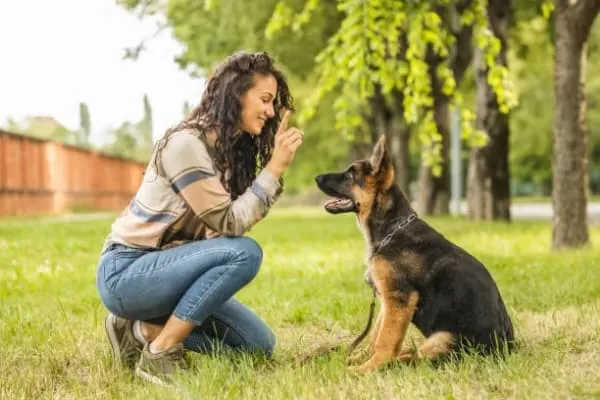
Establishing a routine will build your bond with your Shepherd.
All dogs love routines and require rules to be content.
Although much of what most people thought about the role of dominance in pet dogs and wolves may be wrong, according to VCA Hospital, domestic canids need leadership or they at best become confused, and at worst try to take over the family themselves.
Many Shepherds are not afraid to take on a leadership role, and although rare, truly Alpha individuals exist in the breed.
A bond of mutual respect is challenging but crucial with a dominant dog.
The firmer and more consistent you are about setting boundaries for your GSD, the more he will respect you as his leader.
Although we mention food first, it is by no means the most effective way to gain many Shepherds’ hearts.
However, being the source of nutrition is often an excellent way to garner trust from dogs who have previously suffered mistreatment or who are naturally suspicious.
Training is one of the most effective ways to bond with your GSD.
Obedience may be the first thing you think of in regards to your dog’s education.
While teaching your dog, the callback, stay, heel, and sit is great for establishing an initial partnership with your dog, what happens when your pet masters the basics?
Training basic obedience sets safe boundaries for your Shepherd and gets her accustomed to working successfully with you.
However, once your dog catches onto remedial skills, you will want to continue her schooling.
You can practice different basic skills every day as a review, but you should also incorporate some advanced exercises.
Progressive training can involve teaching your German Shepherd tricks or engaging her in challenging programs like agility, Shutzhund, AKC rally, or lure courses.
Advanced training can form stronger bonds with your dog than obedience alone because it encourages a sense of team accomplishment, a priority for the pack animal.
Moreover, part of bonding is that your dog enjoys being around you. Perform activities that are fun for your dog, and he will look forward to hanging out with you.
German Shepherds will soak up your affection like the next dog, but many of them are first and foremost working dogs.
The GSD has a high energy level and likes to have a job. One of the criteria for a successful Shutzhund dog is that he appears to enjoy what he is doing.
Just as you would for a person with whom you want a good relationship, try to figure out where your dog’s interests lie.
Participate in exercises that spark the most enthusiasm in your Shepherd. Games introduce another avenue for you to gain your Shepherd’s interest and bond with her.
If you want your Shepherd to bond with your entire family, get everyone involved
Actions that you take with your German Shepherd to improve your bond can encourage his tendency to be a one-person dog.
To get your GSD to be a more well-rounded family pet, involve everyone.
At a minimum, all adult family members should have a working relationship with the Shepherd, whereby the dog obeys simple commands.
Confident teenagers and youths over the age of 10 to 12 years could participate in leash walking the Shepherd.
However, in addition to working individually with your pet, group activities can also increase bonds between your family and your Shepherd.
If your dog has a favorite toy, you can maybe play fetch or toss in a group. Other activities to combine family and dog are hiking, camping, and even car rides.
If your German Shepherd gets along with other dogs, you can all take a field trip to the dog park or a canine-friendly beach.
Perhaps have a family member take turns being the primary handler in herding trials or agility courses.
If your Shepherd participates, lure coursing is a fun get together for everyone involved.
It would not be unusual for your German Shepherd to bond more strongly with one person no matter how much you involve other family members.
A Shepherd’s preference for a person is not a negative quality.
- Guarding – A Shepherd will remain protective of the entire family.
- Family – Shepherds are usually aloof with strangers and guests. However, a German Shepherd is generally cordial and friendly with all family members, even if they bond more strongly with an individual. The same dynamics exist in the wolf pack.
- A one-person or –woman dog is great for families where only one member is crazy about owning pets. The one-person Shepherd is not likely to bother other people in the family.

When is a one-person German Shepherd at his best?
Guard Dog
Almost everyone has heard a horror story that featured a Doberman Pinscher or a German Shepherd turning on his owners.
Breeds do not decide one day to attack their owners, but scared, undisciplined, or abused dogs do.
If you do not form a bond with your Shepherd, it is unlikely he will have the trust or motivation to guard you consistently.
While it is highly doubtful your German Shepherd will turn on your; he can display evidence of poor bonding with you as a result of harsh training practices or neglect of any physical or emotional needs.
Police Work
The benefits of the ability of German Shepherds to bond with one person is perhaps no more evident on the police force.
Especially in suspect apprehension and raids, police officers must be able to rely on their dogs as much as they would on a fellow partner.
Read more about How Can the Best GSD Service Dog Do It All?
Military
Canines in the military have come a long way since their ancestors, who suited up in spiked collars and armor and served on the front lines.
World War I and World War II dogs served as messengers and delivered food and other supplies.
The dogs’ bond with their handlers ensured intact communication to carry out such deliveries.
More recently, military working dogs such as Belgian Malinois and German Shepherds have proven invaluable in explosives detection.
Military work requires a deep bond between a dog and her handler to ensure effective communication, trust, and security in life-threatening situations, according to Air Combat Command.
























